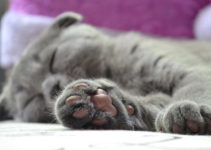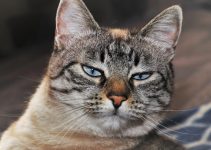This post may contain affiliate links. You can view our affiliate disclosure here.

Having a healthy cat around as your pet is not only fulfilling but also mood-elevating.
However, just like any other animal or pet, cats are susceptible to certain behaviors like panting. This may indicate an underlying medical condition that requires prompt medical attention.
Whether you are a cat owner or you are about to add a cat to the family, if you are concerned about panting behaviors in cats, then this article has you covered.
Let’s explain in-depth what panting in cats is, the reasons why your cat is panting, and telltale signs that the panting is associated with an underlying medical condition.
What is panting in cats?
Panting is an adaptive behaviour in cats that involves quick and short breathing episodes. Most of the time, this behavior is seen in canines or dogs but may at times be seen in cats too. Different cats may exhibit panting at different levels.
Cats that are long-haired or have a small respiratory anatomy (lungs) are more prone to panting regularly and heavily compared to other cat breeds.
Suppose you own a Himalayan, Maine Coon, and Persian cat. In that case, there is no need for concern if they regularly pant after an explainable behavior such as excitement or playing.
Why is my cat panting?
Here are reasons why your cat might pant:
1. Anxiety & Stress
Your cat may experience anxiety and get stressed due to several reasons. Some of the causes of stress and anxiety in cats include:
- a visit to the vet’s office
- meeting strangers (happens mostly when your cat hasn’t been fully socialized)
- history of being neglected
- history of a traumatic event
TIP: before purchasing a cat from a cat breeder, ensure that you are fully acquainted with the cat’s history, especially if you are buying an already-grown cat.
2. Overheating

Cats are susceptible to overheating since their bodies lack sufficient sweat glands on the surface of their skin (fur). As a way of cooling down, your cat will engage in its adaptive behaviour, i.e. panting.
If you suspect your cat is panting due to overheating, you should:
- Immediately remove the cat from a hot environment to a cool and safe environment.
- Moisten the cat’s feet and ears with a clean, wet towel or apply tepid water to its fur.
Never use ice-cold water or ice cubes to cool down your cat as it may cause hypothermia, which is a life-threatening condition characterized by low body temperatures.
3. Vigorous Exercise

Like humans and other mammals, cats will gasp for breath (pant) if they engage in vigorous exercise.
If you notice that your cat pants excessively after engaging in moderate physical activities like running and playing, make sure that you make an appointment with your vet to rule out any underlying medical condition.
In normal circumstances, cats rarely pant, and when they do, there must be an explanatory behavior that justifies the panting episode. Below are some reasons that may cause your cat to pant in an abnormal manner:
4. Respiratory Conditions
Cats can suffer from respiratory infections and diseases that may cause heavy and labored breathing episodes. Some of these conditions include:
- asthma: a manageable condition that’s marked with episodes of panting (heavy and difficult breathing), coughs, and wheezing sounds.
- pneumonia: characterized by noisy labored breathing, runny nose, loss of appetite, and a fast heart rate.
5. Heart Conditions
Congestive Heart Failure (CHF)
This occurs when your cat’s heart does not adequately pump blood to all parts of its body, thus causing fluid backflow to the lungs.
Fluid accumulation will cause your cat to experience difficulty breathing and, therefore, lead to panting.
Heartworm Disease
This is a condition caused by parasitic worms (Dirofilaria immitis) that typically invade the large blood vessels or the heart of an infected cat. Telltale symptoms that your cat may have heartworms include:
- vomiting (may be blood-stained; usually irregular and follows no specific pattern or time)
- labored breathing
- coughing
- diarrhea
Key Takeaway
Cats may sometimes pant due to regular and explainable behaviors like engaging in strenuous activities, overheating, or experiencing episodes of stress and anxiety.
Cats may also experience rapid breathing due to severe, life-threatening medical conditions such as asthma, congestive heart failure, or infection of parasitic heartworms.
If you aren’t sure why your cat is panting and it doesn’t seem normal, it’s important to take it to the vet as soon as possible for an evaluation. Regularly taking your cat to the vet for medical checkups will go a long way in ensuring that your cat leads a healthy and happy life.
Also ensure that you buy your cat from a known cat breeder with a good reputation and legitimate cat breeding license.
Thanks for reading. Is your cat panting? Feel free to share your situation in the comments below.



